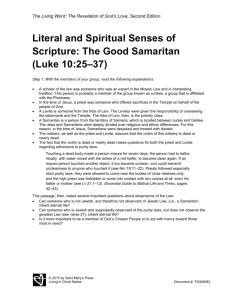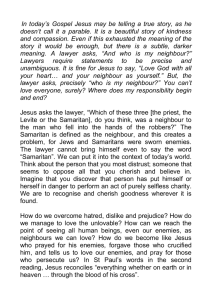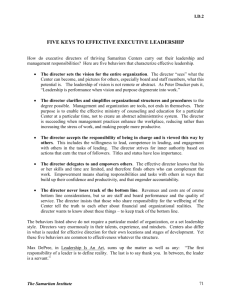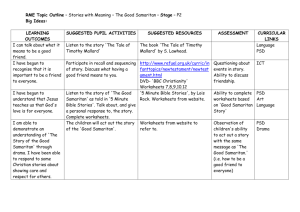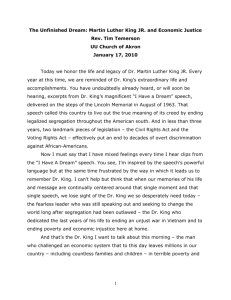July 14 2013, 8 Pentecost, Year C..(in Word DocX format)
advertisement
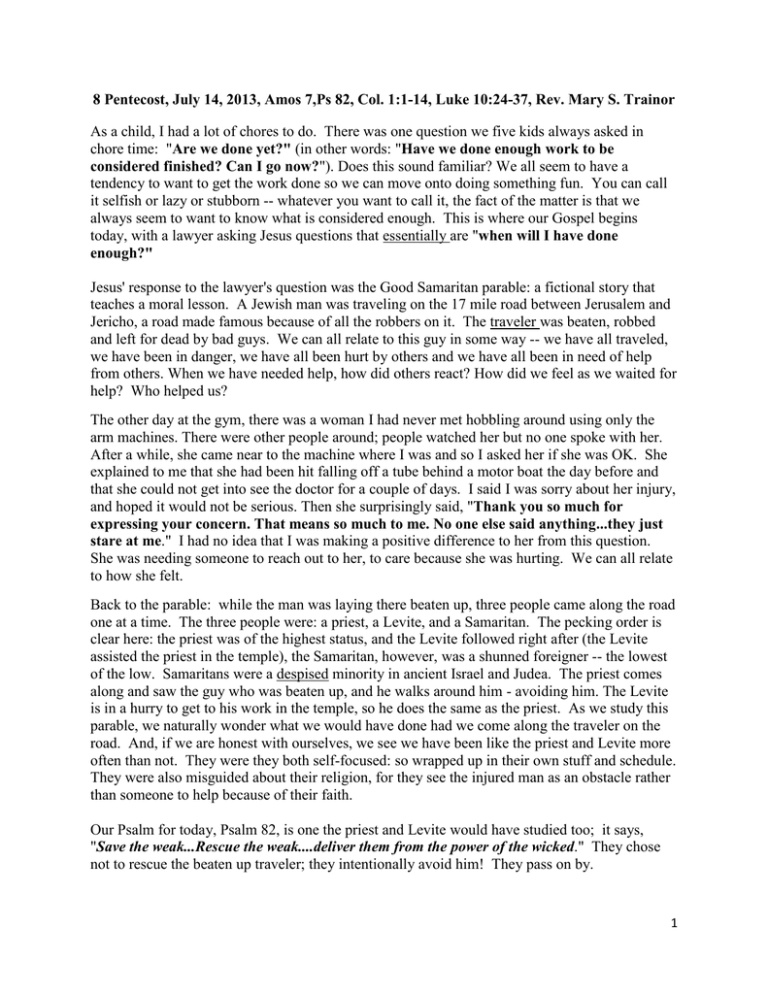
8 Pentecost, July 14, 2013, Amos 7,Ps 82, Col. 1:1-14, Luke 10:24-37, Rev. Mary S. Trainor As a child, I had a lot of chores to do. There was one question we five kids always asked in chore time: "Are we done yet?" (in other words: "Have we done enough work to be considered finished? Can I go now?"). Does this sound familiar? We all seem to have a tendency to want to get the work done so we can move onto doing something fun. You can call it selfish or lazy or stubborn -- whatever you want to call it, the fact of the matter is that we always seem to want to know what is considered enough. This is where our Gospel begins today, with a lawyer asking Jesus questions that essentially are "when will I have done enough?" Jesus' response to the lawyer's question was the Good Samaritan parable: a fictional story that teaches a moral lesson. A Jewish man was traveling on the 17 mile road between Jerusalem and Jericho, a road made famous because of all the robbers on it. The traveler was beaten, robbed and left for dead by bad guys. We can all relate to this guy in some way -- we have all traveled, we have been in danger, we have all been hurt by others and we have all been in need of help from others. When we have needed help, how did others react? How did we feel as we waited for help? Who helped us? The other day at the gym, there was a woman I had never met hobbling around using only the arm machines. There were other people around; people watched her but no one spoke with her. After a while, she came near to the machine where I was and so I asked her if she was OK. She explained to me that she had been hit falling off a tube behind a motor boat the day before and that she could not get into see the doctor for a couple of days. I said I was sorry about her injury, and hoped it would not be serious. Then she surprisingly said, "Thank you so much for expressing your concern. That means so much to me. No one else said anything...they just stare at me." I had no idea that I was making a positive difference to her from this question. She was needing someone to reach out to her, to care because she was hurting. We can all relate to how she felt. Back to the parable: while the man was laying there beaten up, three people came along the road one at a time. The three people were: a priest, a Levite, and a Samaritan. The pecking order is clear here: the priest was of the highest status, and the Levite followed right after (the Levite assisted the priest in the temple), the Samaritan, however, was a shunned foreigner -- the lowest of the low. Samaritans were a despised minority in ancient Israel and Judea. The priest comes along and saw the guy who was beaten up, and he walks around him - avoiding him. The Levite is in a hurry to get to his work in the temple, so he does the same as the priest. As we study this parable, we naturally wonder what we would have done had we come along the traveler on the road. And, if we are honest with ourselves, we see we have been like the priest and Levite more often than not. They were they both self-focused: so wrapped up in their own stuff and schedule. They were also misguided about their religion, for they see the injured man as an obstacle rather than someone to help because of their faith. Our Psalm for today, Psalm 82, is one the priest and Levite would have studied too; it says, "Save the weak...Rescue the weak....deliver them from the power of the wicked." They chose not to rescue the beaten up traveler; they intentionally avoid him! They pass on by. 1 What about the third guy who comes along, the Samaritan, the guy who was discriminated against because of his race and culture. His view of someone who was hurt was different than that of the priest or Levite, because he understood what it was like to be hurt by others. So, what did he do--he sees the injured man, and is instantly mobilized to help. We are told the Samaritan is not only is "moved with pity. He went to him and bandaged his wounds...put him on his own animal, brought him to an Inn, took care of him." Then to top it all off the Samaritan paid for the injured man's room at the Inn: a true rescue! And, a rescue that involved sacrifice. The Samaritan was on his way somewhere, the Samaritan was not a man of great means, and yet his priorities all changed when he saw what needed to be done. Can you imagine the shock of those listening to Jesus when the hero turned out not to be one of them - but an outcast!! This was contrary to their expectations, and ours too. We expect heroes to look like us! Yet, we all want to be like the Samaritan in terms of behavior. And, do you think that the racial and cultural differences between the Samaritan and the traveler mattered during the dramatic rescue? No. All people matter; all are our neighbors. Being neighborly is about our common humanity, under God. Being neighborly is about seeing those in need through the eyes of love, and not as a burden to be passed. We, like the lawyer, priest and Levite, want to limit our responsibility to help others. They are not bad people, but they (just like us) have a lesson to learn. Oh, we will help people who are like us, or people we know, or people who live near us, or people from our church....but we won't help everyone, especially in messy situations. Being neighborly is not about imposing limits and asking "when have I done enough?" The Samaritan did not just feel compassion, he translated the compassion into action and he followed through. So often we feel compassion, but it stops there because we don't know what to do or we are fearful or we just see the burden. How do we change our mentality, from helping others as a burden? We do it with God's help, for God's love is broad and deep. Jesus gave us the GREAT Commandment: "Love the Lord your Go with all your heart, mind, soul, and strength.. and...love your neighbor as yourself." Our ability to love comes from loving God. Our love for others actually indicates the health of our relationship with God. If we live in the shadow of the cross, filled with gratitude because we recognize that God rescued US -- we can't help but be like the Good Samaritan! Here in Shawano--all around us are people seeking someone to care. We all live in our little boxes called houses and drive in our little boxes called cars, and are isolated from each other -this leaves many people as outcasts. To God, no one is an outcast; everyone is deserved of love. Sometimes what we are to do is just be there: say something caring to someone who is hurting, be at a bedside of someone who is sick, take a meal to someone who is down, give someone a ride. Just being there for and with someone is huge! Jesus said, "Go and do likewise." Trust in the Lord and do not pass by, but reach out with God's love. Amen. 2
